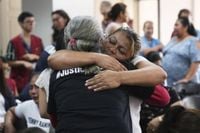In a landmark decision that has reverberated throughout Guatemala and beyond, a court in Guatemala City on August 12, 2025, convicted six former public officials for their roles in the deaths of 41 girls during a 2017 fire at the Hogar Seguro Virgen de la Asunción, a government-run home for at-risk youth. The tragedy, which exposed deep-rooted problems within the country’s child protection system, stands as one of the most harrowing events in recent Guatemalan history.
The convicted individuals, who had all pleaded not guilty, received cumulative prison sentences ranging from six to 25 years. Judge Ingrid Cifuentes, presiding over the emotionally charged courtroom, handed down sentences for charges including manslaughter, abuse of authority, dereliction of duty, mistreatment of minors, and breach of duty. Prosecutors had sought even harsher penalties, requesting sentences up to 131 years for some of the accused, but the final terms fell short of those demands.
Among those sentenced were Carlos Rodas, the former Social Welfare Secretary, who received 25 years in prison, and Santos Torres, the former head of the shelter, who was also sentenced to at least 20 years. Two former police officers, Lucinda Marroquín and Luis Pérez Borja, were convicted, with Marroquín receiving 13 years for her failure to unlock the classroom door during the fire. Brenda Chamán, who oversaw the home’s office against abuse, and Gloria Castro, a former ombudsman focused on children’s rights, were sentenced to 12 and six years, respectively. A seventh defendant, Harold Flores, the former head of child and adolescent protection, was acquitted, as the judge determined she lacked jurisdiction over his case.
The courtroom was filled with raw emotion as family members of the victims hugged and wept while the verdicts were read. Survivors and advocates alike expressed a sense of relief that, after years of legal delays and public outcry, some measure of justice had been achieved. Emily del Cid Linares, 25, a survivor who suffered burns in the fire, told the Associated Press, "I feel like a weight has been lifted from me. What I most feel is that they [the victims] will be able to rest in peace. [Those responsible] are going to pay for what they did." Another survivor, Elba Contreras, 22, echoed the sentiment, saying, "The girls will now rest in peace, and I can let them go."
The events leading up to the fire paint a grim picture of systemic neglect and abuse. On March 8, 2017, a group of girls, aged 12 to 17, found themselves locked in a small classroom at the Virgen de la Asunción home, located about 14 miles east of Guatemala City. The night before, nearly 100 children had attempted to flee the facility, which was notorious for overcrowding, abuse, and deplorable living conditions. The authorities, instead of addressing the root causes of the unrest, rounded up the escapees and locked the boys in an auditorium and the girls in the classroom—without access to a bathroom or adequate supervision. The girls, many of whom were survivors of sexual abuse, violence, or abandonment, had committed no crimes; most were sent to the home by the courts because they had nowhere else to go.
As hours passed, the girls’ pleas to be let out went unanswered. In a desperate act of protest against their treatment, one of the girls set fire to a foam mattress, hoping the blaze would force the police to open the door. Instead, smoke and flames quickly engulfed the room. Witnesses later testified that more than a dozen police officers argued over whether or not to unlock the door, while Marroquín, who held the key, delayed opening it. Phone records revealed that Marroquín was on a call at the time, and a witness testified that when informed about the fire, she responded with profanity and the chilling phrase, "let them burn."
The consequences were catastrophic. Nineteen girls died on the day of the fire, with 22 more succumbing to their injuries in the days and weeks that followed. Fifteen others were severely injured. The facility, designed to house 500 children, was home to as many as 700 at the time, despite a court order to close it a year prior due to its poor conditions. Judge Cifuentes, in her ruling, emphasized that the fire was the culmination of a series of abuses—some of which had been reported to authorities but ignored. Autopsies confirmed the presence of drugs in some of the girls, corroborating their claims that they had been given sleeping pills, which contributed to their efforts to escape.
The verdict has cast a harsh light on Guatemala’s child protection system and the broader failures of state-run shelters. According to AP, the incident prompted international condemnation and calls for sweeping reforms. Edgar Pérez, a human rights lawyer representing some of the victims’ families, remarked, "The state failed and the public officials that oversaw the child-protection system didn’t fulfill their duties." While he acknowledged the significance of the sentencing, he also cautioned that appeals could delay actual imprisonment for those convicted.
In a move that could have far-reaching implications, Judge Cifuentes ordered an investigation into former President Jimmy Morales for his role in deploying police to the facility. This decision has fueled debate within Guatemala about the extent of political responsibility and the need for accountability at the highest levels of government. The judge’s order reflects growing frustration with a system that, for too long, allowed vulnerable children to fall through the cracks.
The tragedy at Virgen de la Asunción has become a symbol of institutional neglect and the urgent need for reform. The shelter’s overcrowding, history of abuse, and lack of oversight were well-known prior to the fire, yet meaningful action was not taken until disaster struck. As Devdiscourse reported, the case has sparked international outrage and renewed scrutiny of Guatemala’s approach to child welfare.
For survivors like Emily del Cid Linares and Elba Contreras, the convictions offer a measure of closure but do not erase the pain of what happened. Their courage in speaking out has played a crucial role in keeping the memory of the victims alive and pushing for accountability. As the legal process continues, with appeals likely on the horizon, advocates hope the case will serve as a catalyst for lasting change in how Guatemala treats its most vulnerable children.
The sentences handed down on August 12, 2025, mark a significant step toward justice for the 41 girls who lost their lives. Yet, as the country reflects on the failures that led to this tragedy, the verdict is a somber reminder that true accountability and reform remain ongoing challenges.



